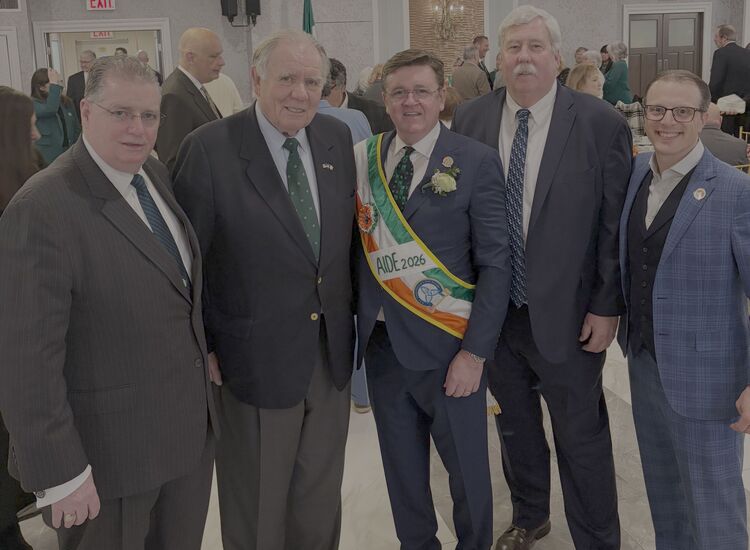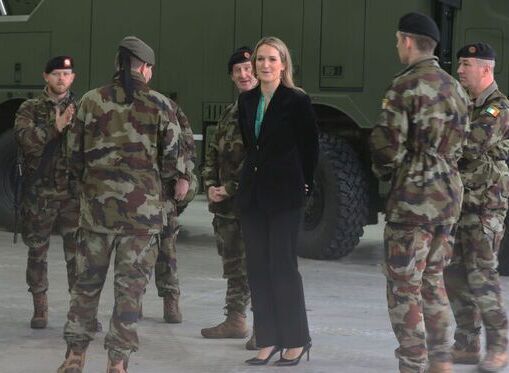Maria Deasy is president of the Irish American Writers & Artists.
By Peter McDermott
The new mayor of New York will need to possess an “X factor.” That’s the view of actress Maria Deasy.
Whether that X factor is defined as personality, charisma or leadership ability, it should be utilized to tap into the spirit displayed by New Yorkers during the pandemic and “to put some definitive programs in place that will get us back on our feet.”
Deasy, the president of the Irish American Writers & Artists, added, “I think that combination is what’s going to be necessary.
“I just don’t know exactly who has it yet, because it feels that everyone has something to offer in this field.”
In any event, those involved in the arts are paying close attention, or at least should be.
“Not only was the theatre shut down but the bartending job was gone, the nanny job was gone,” Deasy said.
“We already had some serious problems before the pandemic in terms of losing our small businesses and our storefronts,” she said. “Now you have that doubled and tripled and the effect of that has trickled down to more people on the street, and contentiousness about how to handle the homeless problem.”
So the priority must be to bounce back from the pandemic.
“When I think what New Yorkers did, it brings me to tears, the way they just dug in and stayed inside and wore the mask. Just the everyday New Yorkers. The frontline workers are just unbelievable heroes. They deserve all the praise they’re getting. They should be honored for what they went through.
“The everyday New Yorkers making it happen. Getting those numbers down -- that’s the best that New York has to offer. That attitude, that strength, that community bonding. We have a lot of crime to contend with now unfortunately because of the economic distress. So we have problems to solve, but if we can draw upon that spirit...”
Deasy has spent much of the past 15 months caring for her parents in New Jersey, while also making trips to check on her apartment in the city. “I didn’t want them to go out,” she said of her mother and father, who are both from County Mayo.
Her father first came to America to do a periodontist’s fellowship at the University of Rochester. The Foxford native had an established dental surgery in England; and he had two brothers in the profession with him, one who went to Dublin and the other also to England. However, the actress’s mother, who is from the village of Strade, close to Foxford, had previously toured America and loved the idea of settling here, which is what the couple did.
“My parents very much raised me to be proud to be an American,” she recalled.
“I spent my childhood going to Ireland a lot. So my Irish identity was really formed through family in Ireland as opposed to in an Irish community [in America].”
Deasy grew up in a “very white-bread town” in New Jersey, where her neighbors’ immigrant roots, of whatever group, tended to go back several generations. “I didn’t think of people with names like Sweeney or O’Neill as Irish because they were American kids with American parents.”
In that sense, her identity was “more direct, more immediate.”
The IAW&A doesn’t make such distinctions. It embraces all, regardless of how they define their connection to Ireland or things Irish. It also welcomes people at different levels.
“It’s very open,” the president said. “You can have a career that is fully developed, you can have a career that you are trying to figure out.
“Everyone gets the mike at a certain point. We really have a non-judgment, non-performative ethos. We are happy for people to perform at the top of their skill set, or their career. There’s room for all of it, which I really love.
“The people who founded it [in 2008] had a very noble idea of bonding together with some progressive ideals and to support each other’s work,” she said.
Deasy suggested that the organization and all those involved in the arts might be kept busy over the next couple of years.
“When there is devastation and when there is turmoil, art arises,” she said. “That’s when artists shine, get put into play to address the emotional healing that needs to take place, after the event.”
This is happening both at the personal level and around national conversations on major issues, notably race. “I think that’s why people create art -- to respond to their internal changes, to their internal life, and also to respond to society’s self-reckonings.”
If artists are dealing with the big questions, sometimes the stage is impossibly large, as in the case of a Broadway production. “You can’t open without it being 85 percent capacity,” Deasy said. “It’s a multimillion-dollar business you’re running.
“But on the lower end of things, what I’m hoping is that that there will be opportunities for smaller spaces, non-traditional theatrical spaces for people to create, for people to perform, for people to respond to the last year and a half, or the last four and a half years.”
Deasy added that something has been lost in the past 10 years and more: “That creativity, that spontaneity, that room for experimentation, room for development, room for something that’s small and not commercial. That has been edged out. For artists, it’s the same way that the mom and pop stores have disappeared because of economics -- a lot of those opportunities for people to be creative on a smaller scale without risking their careers or without having to have big careers.
“There’s no space or time or support for that,” Deasy added. “The priority for the city became development, commercial development. It’s created a different profile of a New Yorker. And for my taste, it’s not as interesting a profile.
“So, I’d like to see creativity come back. I’d like us to be not all about the bank.”
The IAW&A president said some people get concerned when major corporations or banks relocate to states like Florida, but she feels we ought to be just as concerned about the health of smaller businesses.
“If the people of New York saw that [supporting and investing in smaller businesses] as a priority, I think we would be in a better and stronger community and a more creative community. And I think that artists would feel part of the conversation.”
The arts makes an important contribution “to community togetherness, to mental health, our understanding of each other. Unfortunately in this country we don’t value that. We don’t have that tradition.”
There is, though, a long tradition in New York of people pursuing their vocation, their talent, their dream while also holding down the “day job.”
In Deasy’s case, it was a night job as a paralegal, so she could be free to audition for stage and screen roles during the day.
“That lifestyle -- that’s hard. It’s a lot of work. I did it because I love it,” she said. “Earning a consistent living is just not the norm. A little part of you has to be illogical and insane to do any of this.
“It’s not something that society always makes room for or government supports.
“I would hope that the next mayor would have that understanding,” Deasy said.









